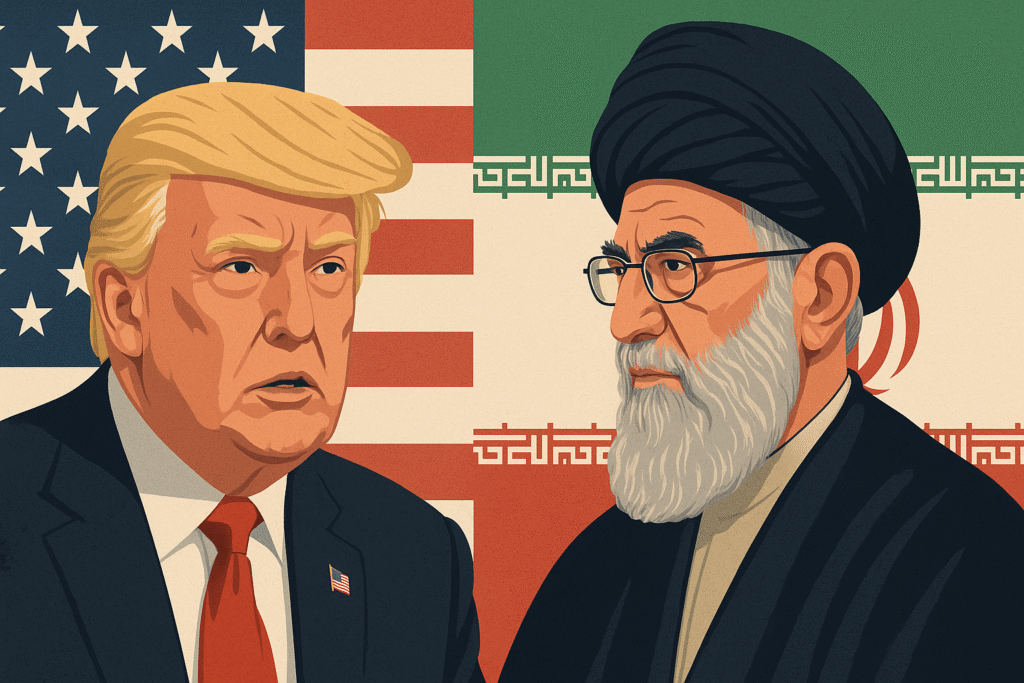U.S. President Donald Trump has announced that negotiations with Iran could resume “in the near future,” as the White House weighs whether to join Israel in military operations targeting Iranian nuclear facilities. The president said he would make a final decision within two weeks, signaling a potential pause in American escalation amid rising Middle East tensions.
“Based on the fact that there’s a substantial chance of negotiations… I will make my decision whether or not to go within the next two weeks,” Trump said in a statement read by White House Press Secretary Karoline Leavitt on Thursday.
Leavitt confirmed that diplomatic channels with Tehran remain open despite a week of missile exchanges between Iran and Israel. She noted that communication has continued through Trump’s envoy, Steve Witkoff, although the nature of those discussions remains undisclosed.
U.S. Military on Standby
Trump’s comments come as American military assets rapidly deploy to the region, raising speculation that Washington is preparing to support Israeli strikes on Iranian nuclear facilities—particularly the Fordow underground site. On Wednesday, Trump had hinted at potential strikes “within days,” but his latest remarks suggest a shift toward exploring diplomatic solutions.
The current conflict erupted after Israel launched preemptive attacks on Iran in a stated effort to dismantle its nuclear capabilities. Iran responded with missile barrages, prompting U.S. assistance to intercept those threats. The Pentagon has since expedited reinforcement of military assets in the region.
European Diplomacy in Motion
The possibility of renewed negotiations aligns with efforts by European powers to prevent further escalation. Britain, France, and Germany—collectively known as the E3—are scheduled to meet with Iranian Deputy Foreign Minister Abbas Araghchi in Geneva on Friday. Their aim is to restore international monitoring of Iran’s nuclear program and potentially broker a commitment from Tehran to reduce its ballistic missile arsenal.
“It’s better dealt with by way of negotiations than by way of conflict… The risk of escalation across the region is obvious,” said UK Prime Minister Sir Keir Starmer. While affirming Israel’s right to self-defense, he emphasized the need for de-escalation.
UK Foreign Secretary David Lammy is also expected to deliver a message to Iranian officials, emphasizing that a diplomatic resolution remains possible. Lammy and UK Ambassador Peter Mandelson met with U.S. Secretary of State Marco Rubio and Mideast envoy Steve Witkoff at the White House ahead of the Geneva summit.
Background: Collapse of the Nuclear Accord
The crisis stems from the collapse of the 2015 Joint Comprehensive Plan of Action (JCPOA), a nuclear accord Iran signed with global powers. Trump unilaterally withdrew from the agreement in 2018, leading Iran to expand its nuclear activities and enrich uranium to levels approaching weapons-grade—though Tehran maintains its program is for civilian purposes only.
Prior to the latest hostilities, Trump’s administration had already engaged in five rounds of indirect talks with Iranian officials aimed at reaching a new framework. A sixth round was scheduled just days before Israel launched its offensive, halting diplomatic momentum.
Israeli Prime Minister Benjamin Netanyahu has voiced strong opposition to any renewed negotiations with Iran, claiming that military intervention is necessary to prevent Tehran from developing nuclear weapons.
Pessimism Remains
Despite renewed diplomatic activity, sources close to the negotiations remain skeptical that Iran is prepared to accept any meaningful deal. Observers note that military options remain firmly under consideration by the White House, even as Trump publicly entertains the prospect of dialogue.
French Foreign Minister Jean-Noël Barrot reiterated his country’s support for diplomacy:
“We have expressed our willingness to take part in negotiations aimed at securing from Iran a lasting rollback of its nuclear programme and its ballistic missile programme… Negotiation remains today the only way to achieve a lasting solution.”
As the region teeters on the brink of broader conflict, the next two weeks will likely determine whether diplomacy or warfare defines the next chapter in U.S.-Iran relations.


